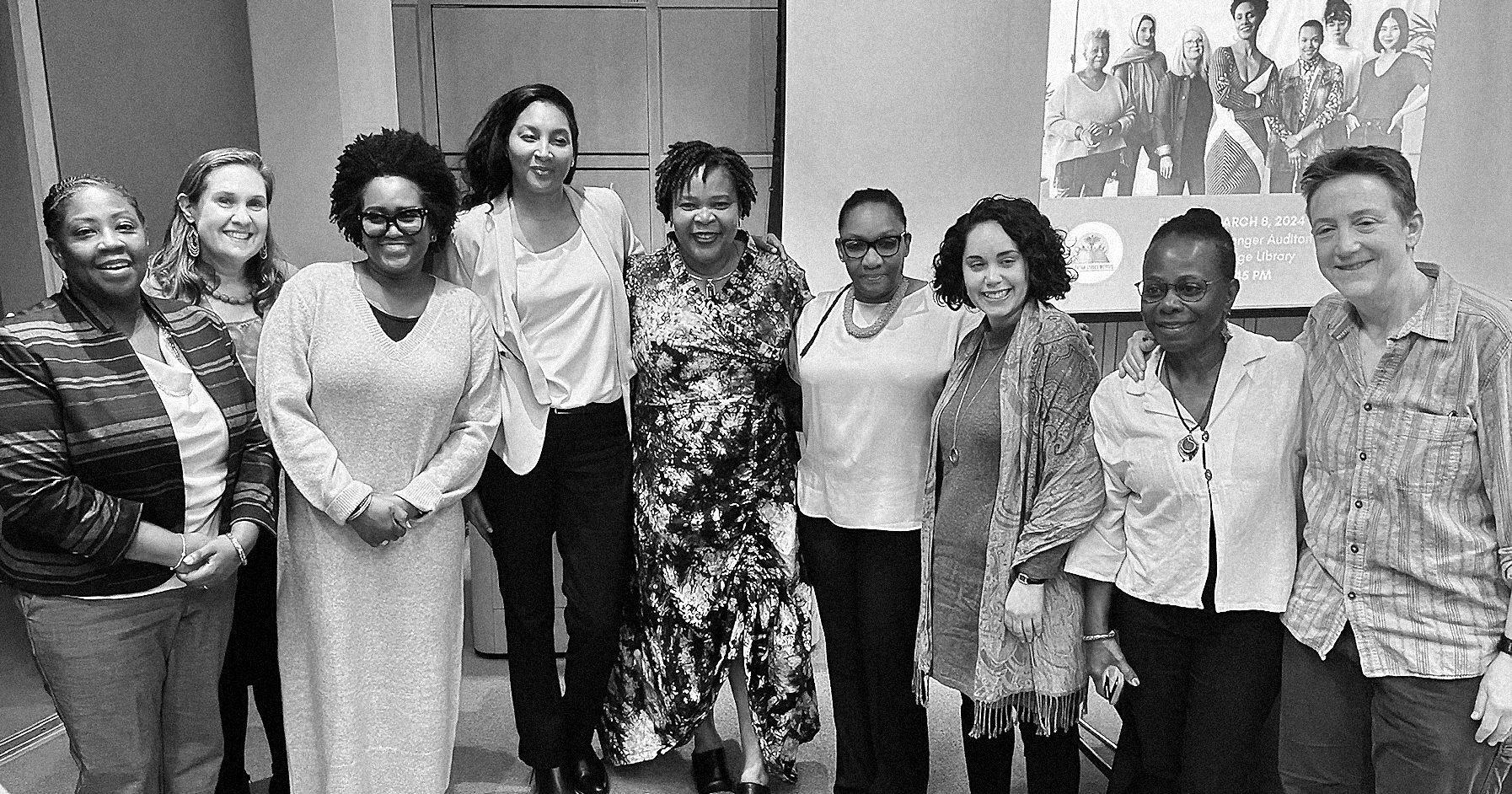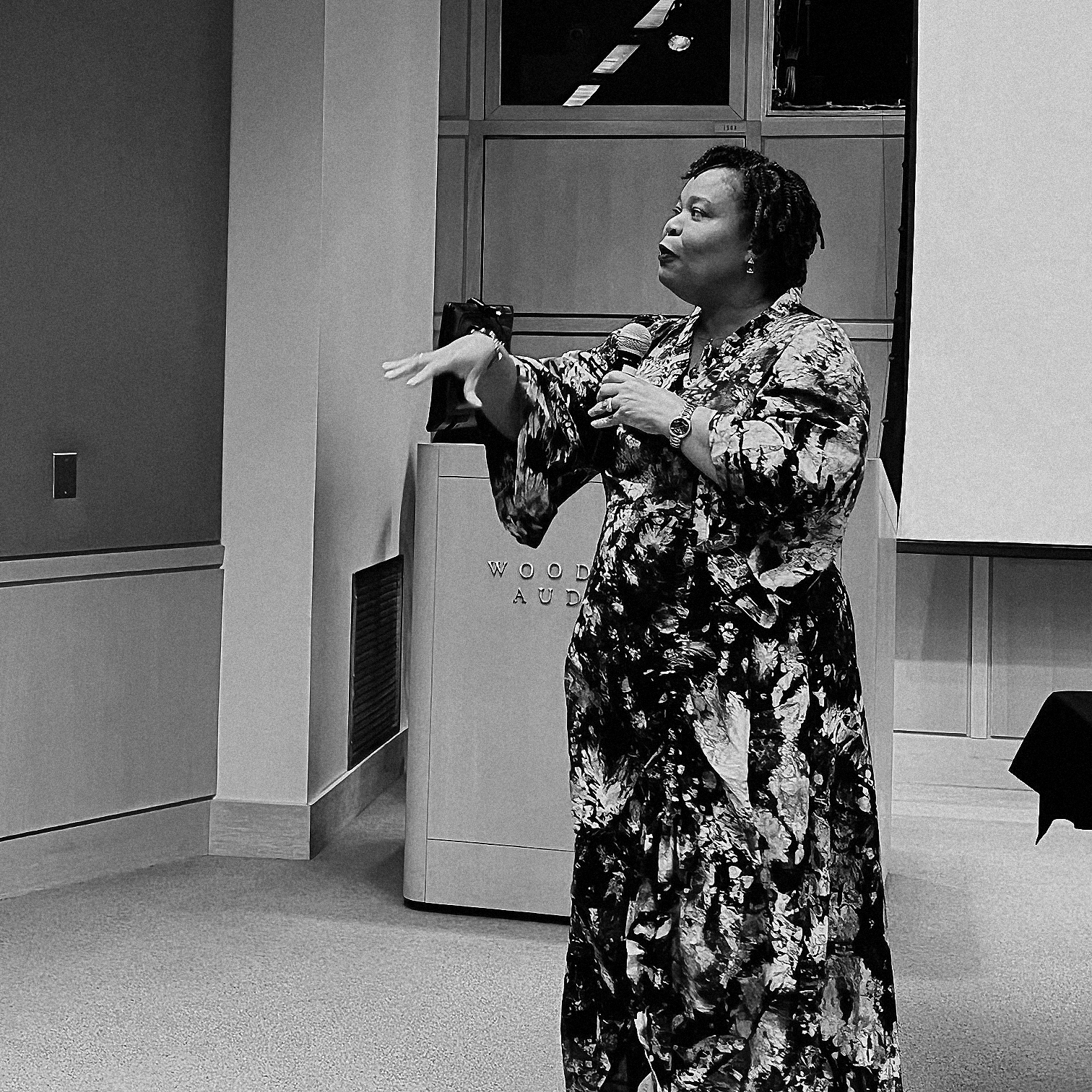Global thought leaders convened on International Women’s Day to talk “Resisting the Policing of Women’s Bodies: Affirming Individual and Collective Rights in 21st Century America”

International Women’s Day Conference attendees at Brooklyn College, image via Institute Staff
“How are women surviving war and conflict spaces? They are addressing challenges with collaboration.” – Nobel Peace Laureate Leymah Gbowee
“We bring people together and we then hope that the record is kept.” – Professor Michelle Bratcher Goodwin
March 8, 2024 marked International Women’s Day—an annual call to action for gender justice advocates across sectors to convene, celebrate, and dialogue. Global thought leaders, local organizers, and leading academics gathered for the occasion for an interdisciplinary and transnational day of exchange at the CUNY Haitian Studies Institute’s conference, “Resisting the Policing of Women’s Bodies: Affirming Individual and Collective Rights in 21st Century America.” The Brooklyn College event, which the Institute co-sponsored, explored attacks on sexual and reproductive health, rights, and justice in the United States, racial and ethnic disparities within health care, including Black women’s maternal mortality crisis, and gender justice globally.
Conference co-chairs Professor Marie Lily Cerat, Director of the CUNY Haitian Studies Institute at Brooklyn College, and Professor Aleah Ranjitsingh, Brooklyn College Assistant Professor, Africana Studies Department, gave welcome remarks and set the tone for much of the thoughtful conversation to follow that day, as its participants urged one another to break siloes and engage in dialogue around gender justice.

Institute Executive Director and Nobel Laureate Leymah Gbowee, image via Institute Staff
Nobel Peace Laureate and Institute Executive Director Leymah Gbowee delivered the conference’s morning keynote address. She discussed women’s peacebuilding work and how academics and different social movements can come together in their pursuit of human rights, and collective humanity. She expressed how for too long, rights and justice sectors have operated in siloes—when often sharing a goal of achieving human rights for all. Ms. Gbowee drew upon different examples of grassroots mobilization and collective action, such as a Pan-African women’s coalition that traveled to an intergovernmental conference in Abuja, Nigeria, to demand a ceasefire in Côte d’Ivoire. She explained that these cross-mobilization tactics are drawn directly from the experiences of women peacebuilders. “How are women surviving in war and conflict spaces? They are addressing challenges with collaboration,” remarked Executive Director Leymah Gbowee.
Ms. Gbowee was asked how she stays motivated and hopeful in her work. She reflected and advised the audience: “Stay grounded in the work and in the communities so that you stay connected to the people that you say you speak for.”
Institute Senior Director Dr. Mikaela Luttrell-Rowland moderated a panel presentation about gender justice in the U.S. and globally, featuring panelists Professor Jillian Báez, Associate Professor of Africana, Puerto Rican, and Latino Studies, Hunter College; Professor Naomie Braine, Professor, Sociology, Brooklyn College; and Carine Jocelyn, CEO, Diaspora Community Services, and Founder, Haitian Women’s Collective.
The three panelists spoke to different aspects of gender justice in the 21st century, domestically and internationally. Professor Báez presented on the experiences of Latina/Latinx women in the United States and beyond. She urged academics to look to Latina/Latinx organizers and to be in their spaces and dialogues, reminding the audience, “We are not alone.” In the aftermath of the Dobbs Supreme Court decision, Professor Braine gave a presentation about abortion rights and lessons learned from Global South movements. She discussed medication abortion’s roots in Latin America and reminded the audience: “This is a movement of the Global South.” Ms. Jocelyn spoke about Diaspora Community Services’ local work in Haitian communities in New York City. She noted, “Brooklyn has some of the worst Black maternal health indicators in the United States,” and explained the need to tackle structural oppression through feminism in connection to racial and queer justice. As Dr. Luttrell-Rowland reflected, the panel “connected across movements, organizers, builders, and sectors.”
The event’s afternoon keynote address was given by Dr. Michelle Bratcher Goodwin, the Linda D. & Timothy J. O’Neill Professor of Constitutional Law and Global Health Policy at Georgetown Law. Dr. Goodwin began her talk in acknowledgement of the convening, and what such gatherings mean for documentation. “We bring people together, and we then we hope that the record is kept.”
Her lecture unpacked dominant narratives of reproduction. Dr. Goodwin reminded the audience that the story of policing women’s bodies cannot be told without the stories of forced reproduction and the histories of colonialism and slavery—not just in the U.S. but also across the Caribbean and Latin America. Dr. Goodwin asked the audience to think about stories such as that of Dred Scott: “His story is told as about his freedom, but it was really about the freedom of him, his wife, and his two daughters. This says a lot about the erasure of Black women and girls… so that we cannot look back and see our own history clearly.”
Dr. Goodwin emphasized the importance of historical context and intentional recognition of the strategies used by activists who have pursued racial and gender justice for years.
***
The event’s Conference Planning Committee included Co-Chairs Marie Lily Cerat and Aleah Ranjitsingh, Michelle J. Anderson, Dale Byam, Stephanie Delia, Judith Dolcé, Stephanie Jensen-Moulton, Mikaela Luttrell-Rowland, Tamara Mose, Jaïra Placide, and Audra Watson.
In addition to the Institute on Gender, Law, and Transformative Peace, the CUNY Haitian Studies Institute collaborated with the Haitian American Lawyers Association of New York and the following departments at Brooklyn College: the Office of President Michelle J. Anderson, the School of Humanities and Social Sciences, the School of Visual, Media and Performing Arts, the Africana Studies Department, the Department of Modern Languages and Literatures, the Department of Puerto Rican and Latino Studies, the Caribbean Studies Program, the Wolfe Institute, the Women’s Center. The conference concluded with a musical performance by Claudia Acuña, a Chilean jazz vocalist, songwriter, and arranger, with pianist Marta Sanchez.
